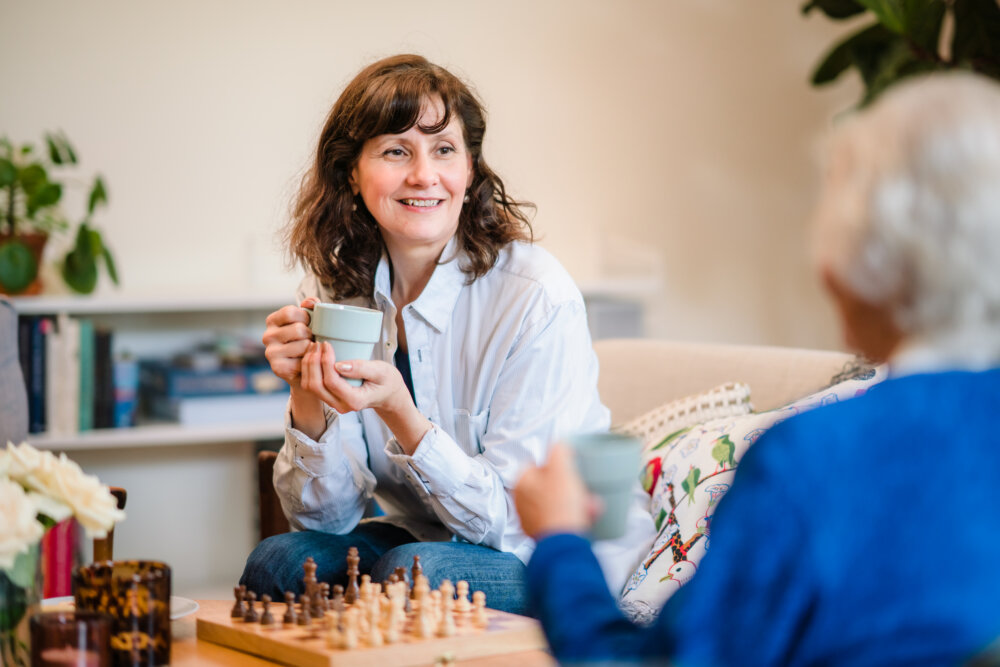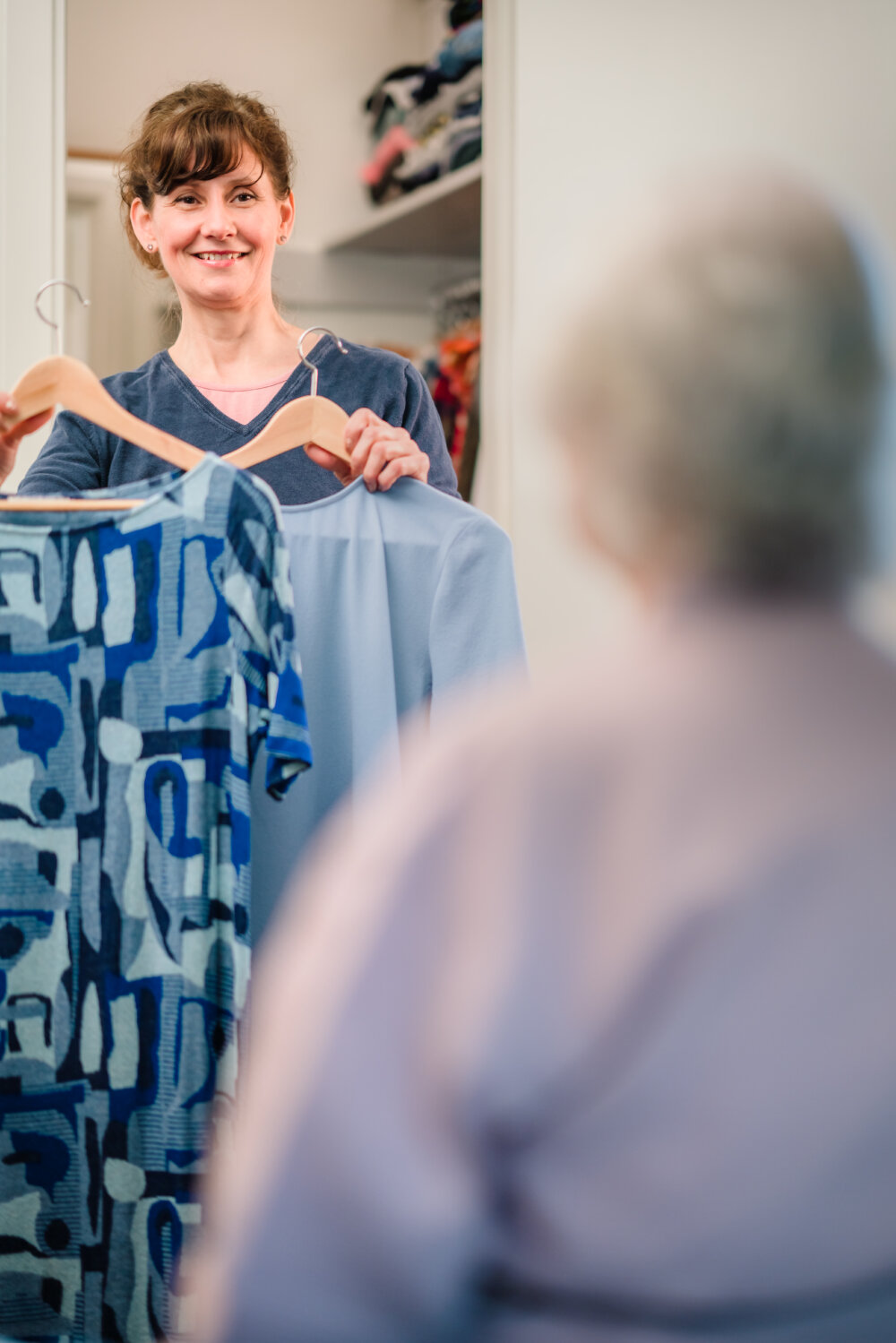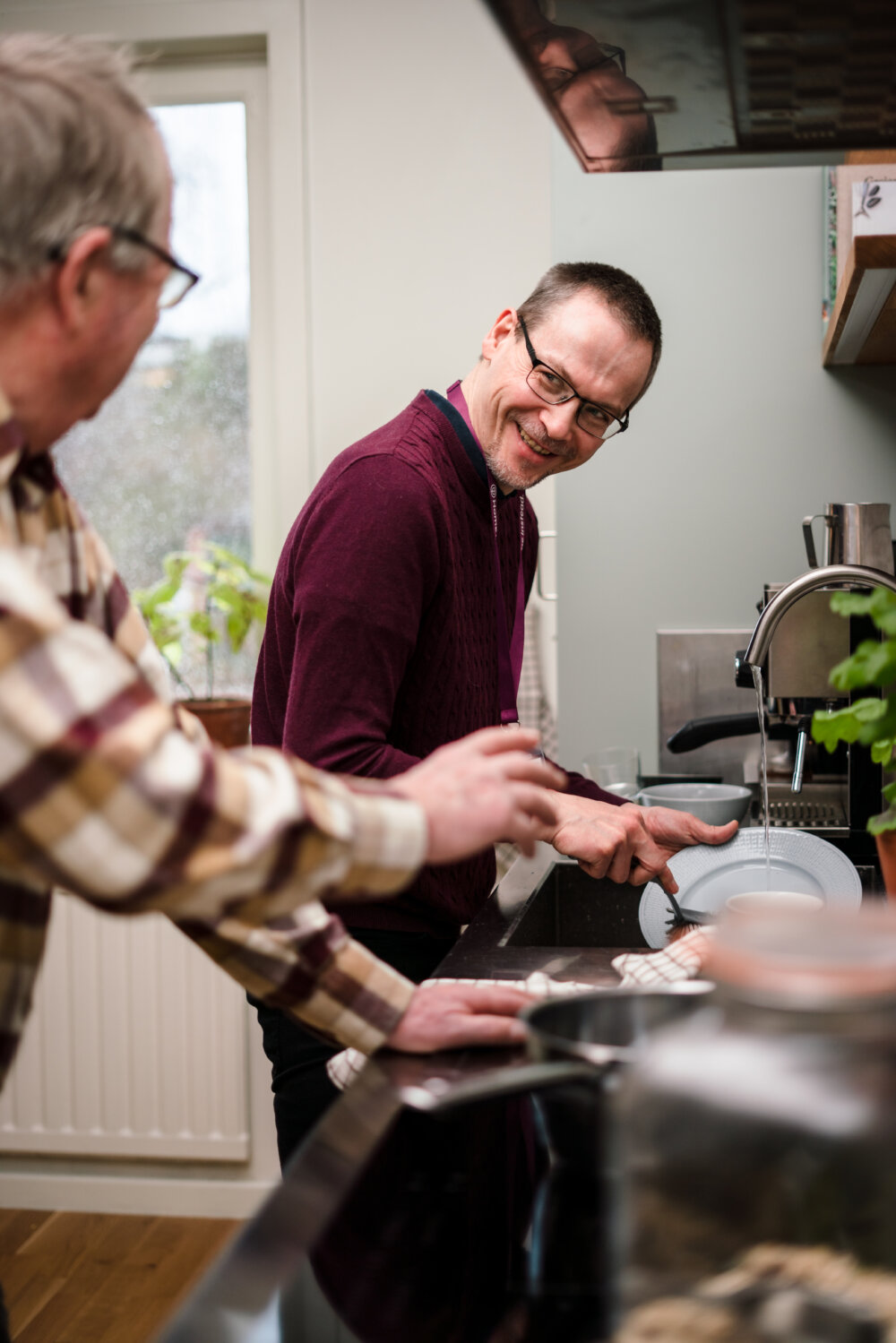How does live-in care work?

The idea of live-in care may seem like the best option for you or your loved one, but it can be difficult to imagine the reality of what this will actually look like in day-to-day life. Will they really stay in the house 24/7? What tasks will they help with? What will they not help with? What do they do overnight? We’re answering all your burning questions about what it’s like to live at home with a live-in carer so you can decide if it could be something you would like to explore. At Home Instead, our aim is to help people age positively and in place by bringing expert care to their home. For nearly 20 years, we have been providing the highest standard of care, and creating industry-leading training programmes for our Care Professionals that are accredited by nursing and medical professionals. Today, we are the world’s largest global home care network, supporting over 100,000 older adults with personalised, tailored care at home. So whatever questions you have about home care, we can help.
Firstly, what is live-in care?
Live-in care is when a trained, professional carer lives with you in your home and provides the appropriate care for your specific needs. This can be an alternative to a care home or nursing home that allows older people to stay in their home for longer, safe in the knowledge that their personal care, specialist medical care, cooking, housework and more can all be taken care of. You can read more in our guide about what live-in care is.
Does your carer really live with you full-time?
It can be hard to imagine someone moving into your house full-time, but many carers will do this in order to provide the very best care for the client. If you hire an agency to provide live-in care, this would usually involve at least 2 different carers working on a rotating shift pattern, due to the all-encompassing nature of the job. Your carer will integrate into your life, but they will still need time off each day, week and month. For example, one carer might stay in your home with you for 2 weeks, then take 2 weeks off while an alternative carer joins you for the next 2 weeks. At the end of 2 weeks, the original carer will return and this pattern may continue on a rotating basis. Other arrangements might be made, such as more carers or shorter shifts, but carers will still take regular breaks. Your carer will live with you in your home, helping with necessary care needs, tasks and chores (read more about what a carer actually does below), and also integrating into your life and routine so they can ensure you are engaging in your interests and hobbies, seeing family and friends regularly, and more. This might mean they eat meals with you, too. A live-in carer will usually:
- Work with another carer to split the live-in arrangement so they can have time off each month
- Work between 8 and 10 hours a day (but be on hand during a 24-hour period for anything that comes up)
- Take a 2 hour break in each 24-hour period to rest and recharge. Breaks can be covered either by a family member or another carer
- Plan their shift patterns around your activities, daily routine and preferences to ensure you are not missing out on care needs
- Plan their breaks and shift patterns so they have time to eat meals themselves (if they prefer to), bathe, and do any other necessary daily tasks
By ensuring carers maintain a healthy work-life balance, they can continue to enjoy living in your home, and you can avoid a turnover of carers that could be disruptive to your life.

What will a live-in carer help with?
You are likely wondering what tasks a live-in carer might get involved in each day. These might include things like:
- Personal care needs such as getting washed and dressed
- Monitoringmedication needs and picking up prescriptions (or administering medication, depending on the type of live-in care you have)
- Cooking, providing adequate nutritional intake, and collecting groceries
- Keeping up with light housework chores, light gardening such as potting plants (but not ‘heavy’ tasks like mowing lawns), and feeding pets if needed
- General companionship so you always have someone around to chat to
- Help getting around the home, and organising travel to places in the community (your carer may drive you places)
- Helping with administration tasks such as paying bills and correspondence
- Waking nights, which means staying awake overnight to provide any necessary care like reaching the bathroom
The specifics of what each carer does will depend on your personal needs and health conditions, so this will look different for everyone. You may only require companionship, personal care assistance and help attending community events, while someone else might need their medication managed, overnight care, and specific help for their health conditions. Your bespoke care plan will be arranged according to your needs before your carer moves into your home, and can be updated as you both settle into the arrangement.
What will a carer not help with?
When someone lives with you, it is easy for the lines between carer and friend to become blurred, so having a conversation in the beginning to establish what a carer will and won’t do can be helpful so both parties know where they stand, and everyone feels comfortable with the arrangement. A few things a carer may not do (or may not be allowed to do) include:
- Deal directly with your finances, for their own protection (this will be the responsibility of your power of attorney)
- Work a 24-hour shift without breaks or support
- Administer medication unless they are trained and competent in doing so. They may instead be in charge of managing medication schedules, reminding you to take your own medication, or coordinating community nurses and other healthcare workers who can administer your medication
- Move you around without the appropriate equipment or help, for your own safety and theirs
- Smoke or drink alcohol within your home, unless you give them permission to do so
- Invite people you do not know into your home
- Help themselves to your food or make phone calls from your home without your permission
- Cook for other members of your family or friends who visit
- Accept gifts or money from you
- Be a witness for any legal documents, for their own legal protection
If you have any questions or concerns about what your carer will not do while living with you, you can speak to the agency providing their services and ask them to clarify exactly what will and will not happen during their shifts.

How should I interact with my carer?
It is important to remember that live-in care is a very different type of job than most people do, so your carer will spend a lot more time with their client, and be asked to do more personal things than most jobs would entail. Developing a close bond with your carer is encouraged, especially if your primary reason for hiring them is to have companionship. At Home Instead, we take great care in matching our carers and clients so you can ensure the person coming into your home every day blends well with your life, routine, interests, and personality. This can enable a successful long-term live-in care relationship. At the end of the day, you can treat your carer as a friend and confide in them how you are feeling, but always keep in mind that carers should be treated with respect at all times, as this is their everyday job. Your home is your home, but it is also their workplace, and they should feel comfortable living there with you.

What if I don’t get along with/have an issue with my live-in carer?
Many older people worry that they will start a contract with a live-in care service and be tied to receiving care from someone they do not like, or in some cases, do not trust or feel comfortable around. At Home Instead, our carers are of the highest professional standard, and we work hard to ensure we match clients with the best carer for their needs and character. Your Care Professional will have had a background check, industry-leading training to ensure they are knowledgeable on your exact situation, and will have undergone the appropriate courses – for example, moving and handling, our City & Guilds assured dementia training, and any other relevant education. If you require a live-in carer with certain experience or specialist training, we will make sure they have the qualifications and experience needed to provide you with the best care. We will also match you with a carer who shares and respects your interests, who drives if you need to get around within your community, who is happy being around pets if you have any, and more. You can also decide if you would like a male or female carer, so you feel entirely comfortable with the arrangement. And if you just don’t feel the right connection with your carer, that’s OK too. You can always reach out to us at Home Instead to arrange a change if needed. “I feel happy all the time in my work. The relationships that you get to build with clients are special and even after a tough day I go home smiling.” – Lindsay, Home Instead Care Professional
Can I accommodate a Live-in carer?
If you are wondering whether or not your home is suitable for a Live-in carer, there are a few checkboxes you should make sure you can tick before you start the process. Some things you will need to provide for your carer include:
- Comfortable, clean and tidy surroundings – If you are struggling with this, you can ask your family to help get your home in ship shape before your Live-in carer starts, or discuss this with the agency before they commence work as they may be able to arrange for some housework to kick-off your arrangement
- A private bedroom – This does not need to be big or fancy, just as long as it is clean, comfortable, heated, and has a bed and some storage for their things
- Internet access – Your Live-in carer needs to be able to manage their work administration which is often done online, so internet access will be required
- Equipment – This could be anything your carer needs to do their job well, such as cleaning supplies, cooking equipment, and so on. Keep in mind that PPE is usually supplied by the agency
- Updates to your home insurance policy – You may need to ensure this covers your Live-in carer for any accidents, damage or loss if necessary – if you are unsure whether or not you need to do this, you can discuss it with your agency before commencement of your carer’s duties
- Safety equipment – The agency may do a check of your home first to make sure it is appropriate for a Live-in carer to move into, and will also check for safety elements, such as smoke and carbon monoxide detectors
Your Live-in carer will only require simple lodgings, so you don’t need to worry about making your home feel like a hotel for them. As long as the home is comfortable so they can relax and recharge regularly to provide you with the best care.
If you choose to pursue Live-in Care through Home Instead, we can discuss everything ahead of time and make sure you have what is needed before your Live-in carer starts work.

What about at night? Will I still be looked after?
If you have had a Care Needs Assessment which has recommended you receive overnight care, you may have a separate carer visit at night for a waking nights service, or your Live-in carer may take on some of these duties too. If you are worried about emergencies at night, needing help getting to the bathroom or getting a drink in the early hours, you can discuss these worries with the agency and ensure your Live-in carer has the appropriate schedule to assist whenever you think they will be needed.
If your carer is not getting an adequate amount of sleep during the night, they may suggest a different arrangement such as another carer taking shifts alongside their own to ensure all carers get the rest they need to perform at their best each day.
What conversations should I have with my loved one if I am arranging Live-in Care?
If you are considering hiring a Live-in carer for an older loved one, it can help to have a conversation with them before their Live-in carer starts work, in order to establish exactly what they would like to happen and any worries they may have. This way you can iron out any issues and establish boundaries with the carer from day one.
You should also consider encouraging your loved one to maintain their independence as much as possible, and not rely on their Live-in carer for everything simply because they are around. Identify what things your relative can still do well and safely on their own, and let their carer know that they should continue to do these things until such times as they can no longer manage.
If you have any questions about arranging Live-in Care for yourself or a relative, you are always welcome to reach out to the Home Instead team who can assist you. Our Care Professionals are highly trained to deliver the individualised services you need, so no matter what type of home care you require, we can provide a tailored service that suits you or your loved one – get in touch to learn more.
We’re an award-winning home care provider and part of a worldwide organisation devoted to providing the highest quality relationship-led care for older people in their own homes. Arranging care for yourself or your loved one shouldn’t be stressful, so whatever questions you would like answered, feel free to reach out to the Home Instead team to discuss your needs.

Diane WIlliams , Head of Quality & Standards
Before joining Home Instead, I built a comprehensive career in the social care sector, beginning in 1991 as a frontline care worker and advancing to senior leadership roles across both private and voluntary sector businesses.
Throughout my career, I have supported diverse care groups in a variety of settings, including community, residential, nursing, and secure environments. My experience spans working with older adults, including those living with dementia; individuals with physical disabilities and complex, long-term health needs; people with learning disabilities, including autism; individuals with enduring mental health challenges; individuals with current or past substance use and those with forensic backgrounds.
In 2002, I qualified as a social worker and have since maintained my professional registration with Social Work England.